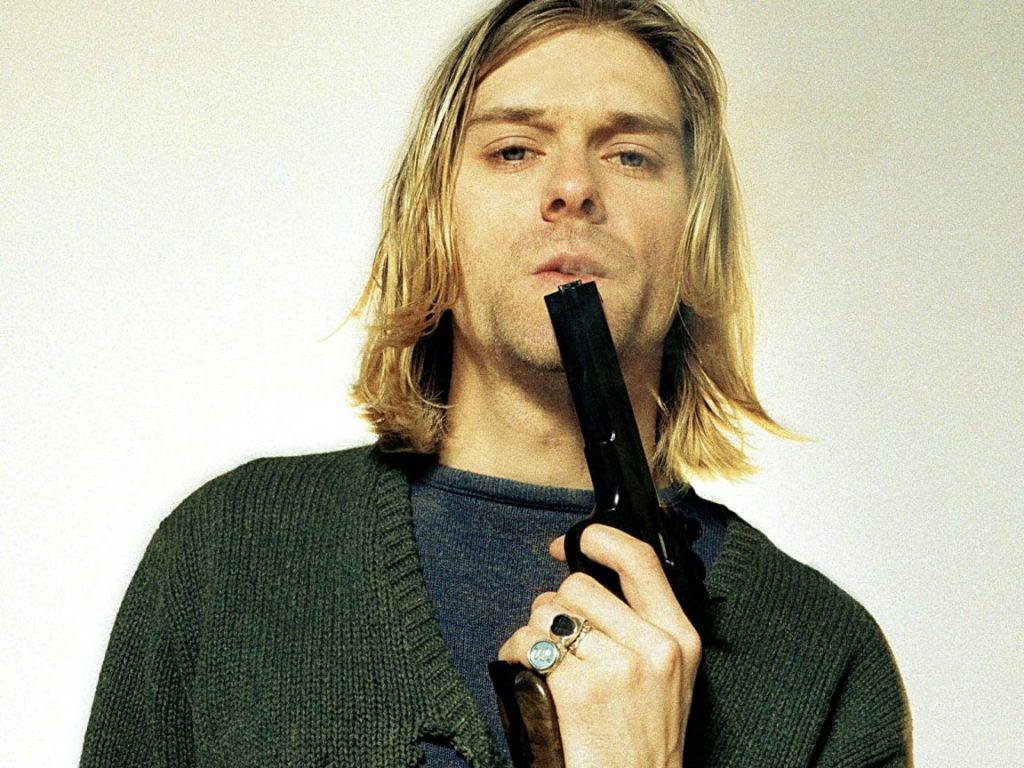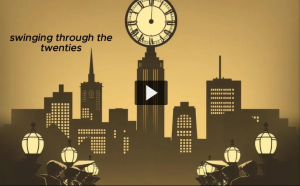“I’m not afraid of dying. Total peace after death, becoming someone else is the best hope I’ve got.” This statement made by Nirvana front-man Kurt Cobain reflects both the self-loathing and general sorrow, or anguish, that he felt he was constantly suffering from and ultimately what led to the tragic event that occurred on April 5, 1994. Kurt Cobain, the lead singer of the band Nirvana, was born in Hoaquiam, Washington on February 20, 1967.1 Few honestly know of the struggles Kurt had to endure in his life, such as his parents’ divorce when he was about nine. This break-up resulted in Kurt losing a permanent place of residence, leaving him in a constant state of borderline homelessness. As a matter of fact, Kurt even resorted to staying at the hospital where he was born around the age of nineteen.2 Regardless, Kurt still managed to climb from rock bottom to become the star he was: the lead singer of Nirvana and the face of grunge music for many people worldwide.

Of course, Nirvana didn’t come straight out the gate making hits nor score international shows. The band Nirvana actually had quite a macabre or fuzzy rise in comparison to other bands. Interestingly enough, Nirvana didn’t even start off being called Nirvana. This small trio actually bounced around with abstract names for quite a few years. From their humble beginnings in Aberdeen, Washington, in 1987 the band was known as Skid Row, Pen Cap Chew, and Bliss all within the same year.3 They played a few house parties and even fewer shows at real venues around the Aberdeen area, but the band life was more of a hobby to the group. They had fun doing what they did, played their hearts out when they had to, but they didn’t really think they were going to be anything huge when they first started out.
The group may have started small, but the effort and time they put into the band would soon enough pay off. In 1989, they released their independent album Bleach, which got them a lot more shows in lots of new places. The band finally started “blowing up” and gathering many followers nationwide. With this newfound momentum, Nirvana signed with Geffen Records and released their second album Nevermind, which has since become legendary. This was just two years after their first independent album Bleach was released.4 Nevermind kicked off Nirvana’s international rise to a new high, scoring them not only shows around the country, but in other countries as well. Nirvana went global and this new, dissonant, and muddy type of rock music started receiving mainstream recognition. This new and quickly popular genre became known and recognized as grunge, a form of punk rock with the muddy sounds of post-punk mixed with a sprinkle of youthful angst.5 This new genre became the sound of the ’90’s, with many bands such as Soundgarden, Pearl Jam, and Alice in Chains riding the wave. But for many worldwide, songs such as “Smells Like Teen Spirit” or most of the songs from Nirvana’s Nevermind album became grunge anthems that depicted the youthful rebellion and dissonance reflected in grunge music.6

Although Nirvana was finally blowing up and rising to international fame quickly, the lead singer Kurt Cobain was still not truly satisfied with his life. Throughout his life, Cobain constantly suffered from stomach illnesses. In response to this constant illness, Kobain would abuse drugs like heroin, claiming it would cure this problem. Even worse, when Kurt met his soon to be mother of his child Kourtney Love, his heroin abuse only got worse.7 With more money and fame, his addiction grew stronger and the pressures of fame and fortune began mounting on his shoulders, until one day it was just too much. In 1994, while on tour in Europe, Kurt had to be hospitalized for drug overdose and other health issues including alcohol problems. Soon after, he was forced to cancel the tour and return back home to Seattle. His family and friends decided to stage an intervention and convince him to admit himself into rehab, much to his displeasure. This rehabilitation did not last long, as Kurt decided to flee the rehab center and return back home to Seattle, tragically unbeknownst to his family and friends. On April 8, 1994, an electrician found Kurt Cobain’s dead body in a room above the garage above his home where he was hiding out at.8 The cause of death was a self-inflicted shotgun blast to the head, and even worse, heroin was found in his system so it’s not even clear if Cobain really meant to do that to himself or if the drugs influenced him to do so.9
Cobain’s inconceivable and unanticipated death resulted in worldwide mourning over the loss of this young artist’s life. Family and friends, especially his girlfriend and daughter, were heavily affected by this tragedy, as well as all of his listeners. Cobain was an icon for Generation X. He gave voice to the youthful generation of people that felt they were dealt a bad hand. He encouraged the generation, and became “the poster boy for grunge.” After Kurt’s death, the grunge scene died down quickly. Of course, there were still other bands in the genre putting out a few successful albums, but the genre never saw the fame and glory it had during its heyday in the early ’90’s, when Nirvana was contributing to the movement.10 The genre died out as quickly as it was born, with the untimely and very unfortunate death of a very talented and tormented young artist.
- Salem Press Biographical Encyclopedia, 2013, s.v. “Kurt Cobain,” by Delbert S. Bowers. ↵
- Nick Soulsby, I Found My Friends: The Oral History of Nirvana (New York : Thomas Dunne Books/St. Martin’s Griffin, 2015). 7. ↵
- Salem Press Encyclopedia, 2013, s.v. “Nirvana (music),” by Alan Haslam; Nick Soulsby, I Found My Friends: The Oral History of Nirvana (New York : Thomas Dunne Books/St. Martin’s Griffin, 2015), 1-18. ↵
- Salem Press Encyclopedia, 2013, s.v. “Nirvana (music),” by Alan Haslam. ↵
- Baker’s Biographical Dictionary of Popular Musicians, 2004, s.v. “Grunge: A Brief History of a Hard Rock Genre,” by Gil Kaufman. ↵
- Baker’s Biographical Dictionary of Popular Musicians, 2004, s.v. “Grunge: A Brief History of a Hard Rock Genre,” by Gil Kaufman. ↵
- Salem Press Biographical Encyclopedia, 2013, s.v. “Kurt Cobain,” by Delbert S. Bowers. ↵
- Salem Press Biographical Encyclopedia, 2013, s.v. “Kurt Cobain,” by Delbert S. Bowers. ↵
- Salem Press Encyclopedia, 2013, s.v. “Nirvana (music),” by Alan Haslam. ↵
- Baker’s Biographical Dictionary of Popular Musicians, 2004, s.v. “Grunge: A Brief History of a Hard Rock Genre,” by Gil Kaufman. ↵



112 comments
Virginia Alonso
As being fairly new to Kurt and his history within the band , I find this article extremely helpful in finding a minor background to the lead singer who faced a tragic death. Questions which linger inside my thoughts are on going further into his relation with Courtney Love and the details leading into the many conspiracies that continue making a mark on his legacy today. I liked how you were able to highlight the rise and fall he had faced in a way Kurt’s darker past was brought into light rather than the overshadowing media today asserting over passed away icon’s images such as Michael Jackson or Prince for example. Though it is heartbreaking he is gone, his influence and inspiration will continue to live on, as there is no one who can ever replace him. Kurt was truly one of a kind.
Kiana Contreras
What a great written article. Very informal, one of the things which I didn’t know about Nirvana was that they had various band names like Skid Row or Bliss. Also had no idea Cobain had heroin in his system when he passed, truly tragic. Even more depressing that he was so young when it occurred. After reading this article I now know more about the dark struggles of Kurt Cobain.
Monserrat Garcia
I had never known about Kurt Cobain’s struggles before reading this article. Addiction is such an unpredictable and devastating thing and unfortunately, it has taken the lives of many including Cobain… I did not know he was 27 when he passed, which makes it even more sad and unfortunate. His music has inspired millions and will continue to inspire even more.
Maria Moreno
The best artists usually have had many troubles in their early years. Its like music, acting, or other arts help them find their true self and they create wonderful things. Another thing that has happened to many artist is there comes to be a drug problem and most of the time it doesn’t end well. It must be tough having to deal with all the pressure, I guess, but its also sad when for example your in a band and you’re the one letting down your team mates. By the way, I think the picture of Cobain performing live you chose was really good as well, I liked how the wings in the background appear to be his own.
Christopher Jordan
Hey Kailan, great article. I think its fair to say Kurt Cobain’s demon’s ad struggles with substance abuse were no secret, but your article did a very good job diving deep into these and also explaining what led Cobain down this path. I’m a big Nirvana fan and I found this article really engaging, especially after reading a similar article on the website about Alice In Chains.
Julianna Zamora
I remember the first time I heard ‘Smells like Teen Spirit’ as kid on the car ride home with my dad. At that point, I was infatuated by their band and began listening to them more. I knew that Kurt Cobain had a rough childhood, but I never knew it was to the extent of where he was basically homeless. It was interesting to read how the band changed its name early on numerous times and within four years, they would be one of the biggest grunge bands to ever exist. I love how the author included personal details about his life, such as the intense stomach issues to give the readers a more descriptive understanding of the pain he was in and why he turned to drugs. Overall, this article on Kurt Cobain was descriptive in the details of Kurt’s personal life and Nirvana’s rise to fame and how ultimately it lead to his tragic ending.
Justine Ruiz
Nirvana is one of my favorite bands to listen to! I knew about Curt abusing drugs throughout his life but I never knew why. This article really taught me about his stomach illnesses and how sad he was beforehand. However, I feel like this article could’ve went into more details throughout his life because I felt like everything was a bit vague for people who have never listened to his music.
Haley Aleman
Having been someone who’s been greatly influenced not only by Nirvana but by the entirety of the punk scene, I’m a little disappointed that the author didn’t go further into detail as to why Kurt’s relationship with Courtney Love had such a bad influence on him, or why they thought that the punk scene’s been different or has almost dissipated since his death. Sure we lost a major icon and it won’t be the same as it once was, but I don’t think it’s dead for a number of reasons that I won’t explain because quite frankly that’ll turn into an essay. However that aside, I think that the author was wise in talking about the band’s earlier years and what lead them to fame. A part of me wishes that they would’ve talked about the many conspiracies behind his suicide and why some people think that he was actually murdered and it was a setup. Kurt had an extraordinary mind when it came to lyricism and it shows in his voice. I always loved nirvana just because of the raw emotion that you could physically feel from it. For those that don’t know much about nirvana, I would say that this article is a good starting point.
Andrea Degollado
I had never really herd of Kurt Cobin, however i found this article very interesting and informative. I had no idea how troubled Cobin’s life was. However i didn’t really find his heroin addiction too surprising, in the world of fame it is quite common to read about celebrities who have some sort of addiction or drug problem. I think reading about his death was very saddening and was so sad to see how someone with his talent came to die.
Arsema Abera
I never knew about the sad beginnings of Kurt Cobain, about his parents divorcing and his homelessness. Nevertheless, Nirvana was an awesome band, I love listening to their music and if they hadn’t disbanded I think they would have made great music. the drugs got to him first but I wish he had the strength to pull through. This article was really brief and I wish it had a lot of info, but all in all, it was a great article.